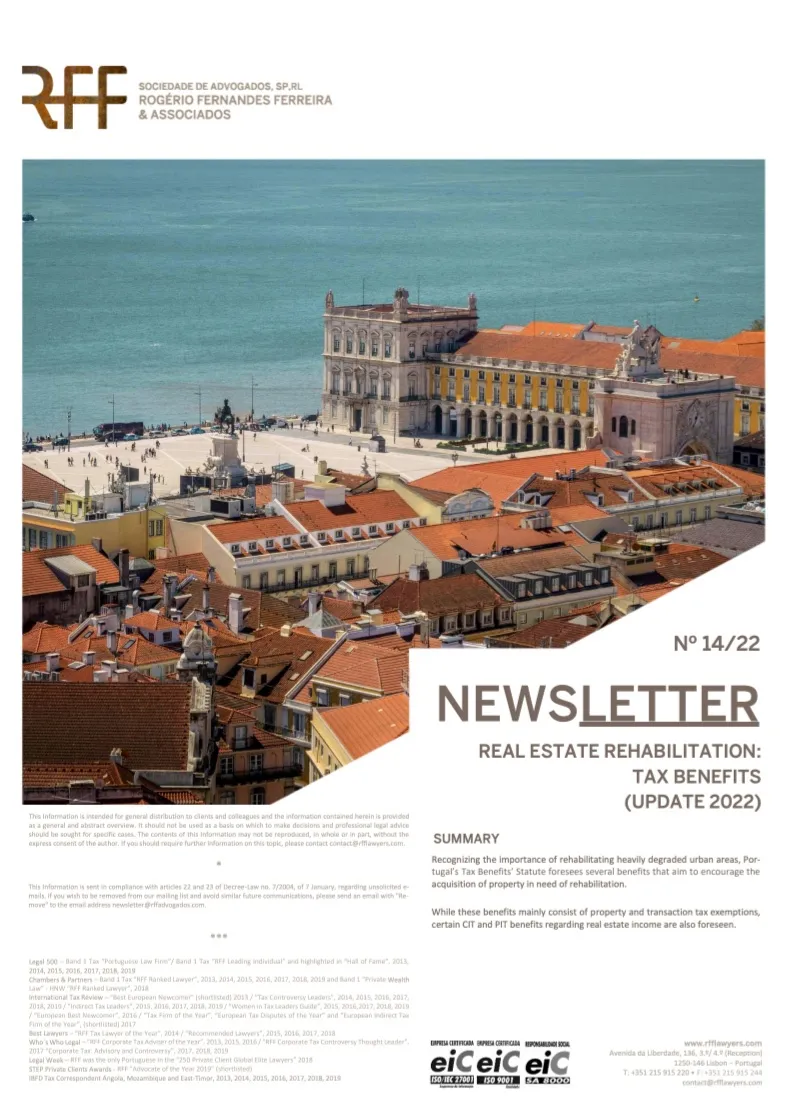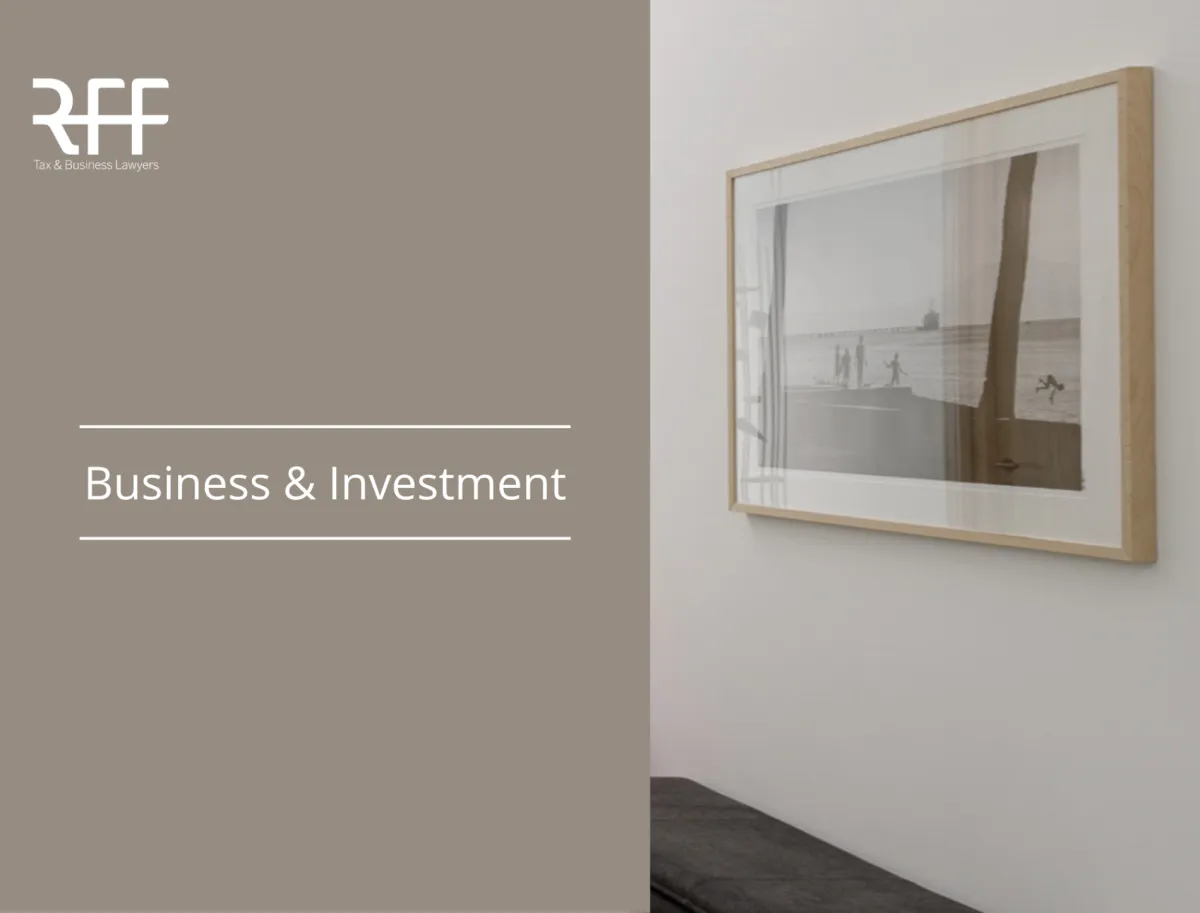Real Estate Rehabilitation: Tax Benefits (UPDATE 2022)

Real Estate Rehabilitation: Tax Benefits (UPDATE 2022)
SUMMARY
Recognizing the importance of rehabilitating heavily degraded urban areas, Portugal’s Tax Benefits’ Statute foresees several benefits that aim to encourage the acquisition of property in need of rehabilitation.
While these benefits mainly consist of property and transaction tax exemptions, certain CIT and PIT benefits regarding real estate income are also foreseen.
BACKGROUND
Recognizing the importance of urban rehabilitation and revitalization towards sustainability, especially in heavily degraded areas, Portugal’s Tax Benefits’ Statute (Estatuto dos Benefícios Fiscais or EBF) foresees several benefits meant to encourage the acquisition of property that has a poor conservation status and requires rehabilitation.
These incentives consist mainly of property tax (IMI) and transaction tax (IMT) exemptions, assuming that certain requirements are met. However, the EBF also foresees some CIT and PIT-related benefits regarding real estate income, such as rents.
PROPERTY TAX (IMI) EXEMPTION
The EBF states that rehabilitated property may be eligible for IMI exemption for a three-year period.
If the property in question is registered and utilized for (i) the tenant’s permanent residence or (ii) the owner’s permanent residence, the duration of this exemption may be extended for an additional five-year period, subject to approval by the city council.
In any case, for this exemption to apply, the urban property must have been built at least 30 years prior to rehabilitation and situated in specifically designated rehabilitation areas.
In addition, the following criteria must be met:
- the rehabilitation works must be conducted under the Portuguese Urban Rehabilitation Regime (Regime Jurídico da Reabilitação Urbana) or the special regime foreseen in Decree no. 53/2014, from April 8th (Decreto-Lei n.º 53/2014, de 8 de abril); and
- the rehabilitation must result in a two-level upgrade in the property’s current official conservation status and become graded as “good” as a result, while also meeting certain energy and thermal requirements.
In addition, if these criteria are met, the fees owed for the property’s conservation status’ evaluation process should be halved.
The rehabilitation process and the fulfilment of these criteria, for exemption purposes, should be recognized by the city hall or the entity in charge of urban rehabilitation, which in turn is charged with communicating said recognition to the competent tax office.
TRANSACTION TAX (IMT) EXEMPTION
Regarding IMT, the EBF foresees the following exemptions:
- exemption on the acquisition of property meant for rehabilitation, as long as the works begin within three years; and
- exemption on the first transaction held after the rehabilitation works are completed, as long as the property is registered and utilized for the tenant’s permanent residence or the owner’s permanent residence (in which case, the property must be situated in one of the specially designated rehabilitation areas).
These exemptions are subject to the same criteria and approval rules applicable to the IMI exemption.
REAL ESTATE INVESTMENT FUNDS
The EBF also foresees a CIT exemption on the income obtained by real estate investment funds, regardless of the nature of said income.
For this exemption to apply, real estate investment funds must have been incorporated between January 1st, 2008, and December 31st, 2013, they must operate in accordance with Portuguese legislation, and 75% of its real estate assets must have been effectively rehabilitated and be situated in one of the specially designated rehabilitation areas.
Income distributed by a real estate investment fund to its investors, whether through simple distribution or withdrawal, will be subject to a 10% PIT or CIT flat rate, depending on the nature of the investor.
This reduced tax rate will not apply if the investor benefits from an investment tax exemption or the investor is a foreign tax resident, without a permanent establishment in Portugal to which the income may be attributed, except:
- the investor is a tax resident in a tax haven; and
- the investor is a foreign tax resident entity that is not held, in at least 25% of its share capital, by Portuguese tax resident entities.
In case the investors are foreign resident entities that do not have a permanent establishment in Portuguese territory, or Portuguese PIT subjects that receive their income from activities unrelated to commerce, industry, or agriculture, withholding tax will be definitive. As an alternative, they may choose to aggregate the income, in which case it will be seen as a tax advancement.
As for capital gains obtained from the sale of shares held in a real estate investment fund, they will be subject to a 10% flat tax rate, as long as the investor is (i) a foreign tax resident to whom the EBF’s special non-residents’ capital gains exemption does not apply, or (ii) a Portuguese PIT subject and tax resident, whose income comes from activities unrelated to commerce, industry, or agriculture and the income aggregation option is not taken.
These benefits may only apply if the property’s rehabilitation works began after 1 January 2008 and were concluded before 31 December 2020.
CAPITAL GAINS
The EBF foresees am autonomous 5% PIT flat rate for Portuguese tax resident individuals regarding capital gains obtained from the first transaction held after rehabilitation, as long as the property is located in one of the specially designated rehabilitation areas and the income aggregation option is not taken.
RENTAL INCOME
Moreover, rental income obtained by Portuguese tax residents will be subject to PIT at a 5% flat rate, unless the income aggregation option is taken.
DEDUCTIBLE EXPENSES
Up to 30%, up to a maximum of Euro 500, of rehabilitation expenses incurred may be deducted from the property owner’s taxable income, if:
- the rehabilitated property is located in a specially designated rehabilitation area; or
- the rehabilitated property is rented under Portugal’s new Urban Rental Regime (Novo Regime de Arrendamento Urbano or NRAU).
AFFORDABLE RENT PROGRAMS
Finally, the EBF foresees a CIT and PIT exemption on rental income obtained from a property that is included in one of Portugal’s affordable rent programs, applicable for the duration of the rental contracts.
Regarding PIT, if individuals choose income aggregation, the exempt rental income will still be computed when determining the general progressive rates applicable to their global income.
As a final note, it should be mentioned that this exemption must be officially recognized by the Portugal’s Ministry of Finance.
***
Lisbon, 25 March 2022
Rogério M. Fernandes Ferreira
Marta Machado de Almeida
Soraia João Silva
Inês Tomé Carvalho
(Tax Advisory team)
